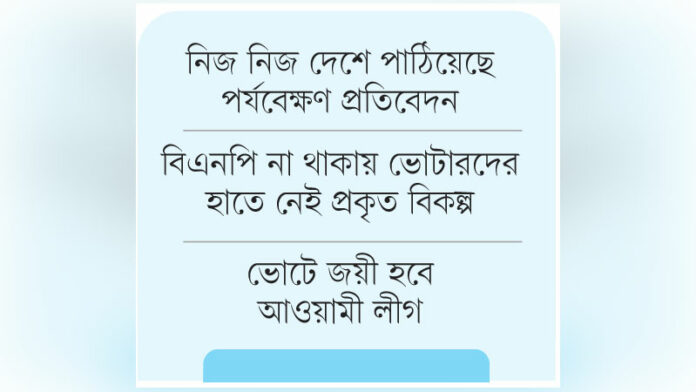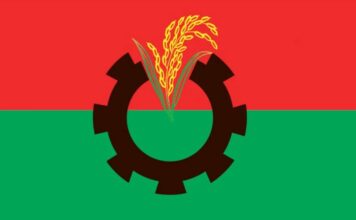There are various kinds of analysis going on in the country and abroad about the 12th parliament election. Foreign diplomats working in Dhaka are also keeping a keen eye on this election. Some Western diplomats have observed that the upcoming national elections in Bangladesh lack real competition and voters have no real choice to choose their representatives. As a result, Awami League will win the election on January 7.
According to the sources of the embassies of some western countries in Dhaka, they have made a report by observing the election situation from the announcement of the poll till December 19. In the meantime, the report has been sent to the Ministry of Foreign Affairs of their respective countries. Speaking to some diplomats of those countries, they all gave almost the same observation. However, no one agreed to make an official comment on this matter.
A diplomat of a Western influential country told Samakal on condition of anonymity, "There is no doubt that the Awami League will come back to power through the elections. However, there is a lack of real competition in the elections. The main opposition BNP and like-minded coalition parties have boycotted the elections, leaving voters with no real option.
Various embassies have condemned the incidents of conflict and violence surrounding this election. Along with that, they mentioned in the monitoring report the need to bring those involved in conflict-violence to justice.
There is regret in the European Union (EU) for not being able to convince all political parties to create an environment for a participatory election in Bangladesh. A diplomat from an EU country said that pluralism in politics, democratic values and international standards of human rights should be followed by everyone. These help to maintain continuity in the development of the country. And it will help Bangladesh to get GSP Plus of EU. Because one of the conditions of EU's GSP Plus is – democracy, human rights and good governance. The diplomat said that an EU expert team is visiting Bangladesh to observe the elections. They will give their report a few weeks after the vote.
On the condition of anonymity, another Western diplomat told Samakal, 'The way the election is going, it will not be a mistake to ask him to choose a worthy candidate of the ruling party. Because the way the whole matter has come forward, Awami League is the rival of Awami League. One of them got the boat symbol, the other didn't.'
However, most of the Western countries accept this reality, he said, 'If we ask a one-day-old child to run and punish him for not being able to run, it will be an injustice to that child. Apart from that, each country has its own priorities regarding Bangladesh, which are different from others. Western countries are responding with that priority in mind.' This diplomat also said, 'The real picture should be presented in the observation report. But this does not mean that our position has changed.'
Another Western diplomat spoke to Samakal about the Bangladesh election. However, he also refused to reveal his name. This diplomat said, 'After working for more than three years, I have brought an agreement with Bangladesh to the final stage. If the government changes, it has to start afresh. As a result, we have to respond conservatively.'
The United States announced its position on Bangladesh. They expect a free and fair election in Bangladesh. Washington has also announced that visas will not be issued if the democratic process is obstructed in Bangladesh. Meanwhile, Russia, India and China said that the election is an internal matter of Bangladesh. The election will be held according to the constitution of Bangladesh; Rather, they think that the United States is interfering in the internal affairs of Bangladesh. Apart from this, each country including France, Germany, United Kingdom, Canada, Italy, Norway, Netherlands, Switzerland, Japan has its own perspective, strategic goals and priorities regarding Bangladesh.
Foreign diplomats say that instead of putting pressure on human rights, labor rights, democracy and good governance, they are in the mindset of cooperation with Bangladesh. The case of maintaining GSP benefits for Bangladeshi products in the EU till 2032 and supporting the progress of the labor sector is a precedent.
EU Ambassador in Dhaka Charles Whiteley told Samakal, 'Like GSP, the EU has its own view on elections in Bangladesh. The EU takes its own decisions, but also consults with allies.'










